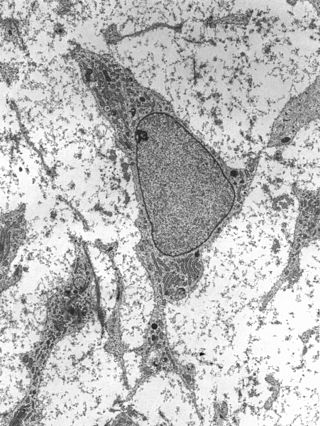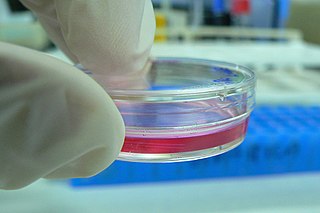
Digital Enhanced Cordless Telecommunications (DECT) is a cordless telephony standard maintained by ETSI. It originated in Europe, where it is the common standard, replacing earlier standards, such as CT1 and CT2. Since the DECT-2020 standard onwards, it also includes IoT communication.

In multicellular organisms, stem cells are undifferentiated or partially differentiated cells that can change into various types of cells and proliferate indefinitely to produce more of the same stem cell. They are the earliest type of cell in a cell lineage. They are found in both embryonic and adult organisms, but they have slightly different properties in each. They are usually distinguished from progenitor cells, which cannot divide indefinitely, and precursor or blast cells, which are usually committed to differentiating into one cell type.

A wireless LAN (WLAN) is a wireless computer network that links two or more devices using wireless communication to form a local area network (LAN) within a limited area such as a home, school, computer laboratory, campus, or office building. This gives users the ability to move around within the area and remain connected to the network. Through a gateway, a WLAN can also provide a connection to the wider Internet.

Authentication is the act of proving an assertion, such as the identity of a computer system user. In contrast with identification, the act of indicating a person or thing's identity, authentication is the process of verifying that identity. It might involve validating personal identity documents, verifying the authenticity of a website with a digital certificate, determining the age of an artifact by carbon dating, or ensuring that a product or document is not counterfeit.

Serum is the fluid and solvent component of blood which does not play a role in clotting. It may be defined as blood plasma without the clotting factors, or as blood with all cells and clotting factors removed. Serum contains all proteins except clotting factors, including all electrolytes, antibodies, antigens, hormones; and any exogenous substances. Serum also does not contain all the formed elements of blood, which include blood cells, white blood cells, red blood cells (erythrocytes), and platelets.

A microbiological culture, or microbial culture, is a method of multiplying microbial organisms by letting them reproduce in predetermined culture medium under controlled laboratory conditions. Microbial cultures are foundational and basic diagnostic methods used as research tools in molecular biology.

Chinese hamster ovary (CHO) cells are a family of immortalized cell lines derived from epithelial cells of the ovary of the Chinese hamster, often used in biological and medical research and commercially in the production of recombinant therapeutic proteins. They have found wide use in studies of genetics, toxicity screening, nutrition and gene expression, and particularly since the 1980s to express recombinant proteins. CHO cells are the most commonly used mammalian hosts for industrial production of recombinant protein therapeutics.

Cell culture or tissue culture is the process by which cells are grown under controlled conditions, generally outside of their natural environment. After cells of interest have been isolated from living tissue, they can subsequently be maintained under carefully controlled conditions. They need to be kept at body temperature (37 °C) in an incubator. These conditions vary for each cell type, but generally consist of a suitable vessel with a substrate or rich medium that supplies the essential nutrients (amino acids, carbohydrates, vitamins, minerals), growth factors, hormones, and gases (CO2, O2), and regulates the physio-chemical environment (pH buffer, osmotic pressure, temperature). Most cells require a surface or an artificial substrate to form an adherent culture as a monolayer (one single-cell thick), whereas others can be grown free floating in a medium as a suspension culture. This is typically facilitated via use of a liquid, semi-solid, or solid growth medium, such as broth or agar. Tissue culture commonly refers to the culture of animal cells and tissues, with the more specific term plant tissue culture being used for plants. The lifespan of most cells is genetically determined, but some cell-culturing cells have been 'transformed' into immortal cells which will reproduce indefinitely if the optimal conditions are provided.
Human embryonic kidney 293 cells, also often referred to as HEK 293, HEK-293, 293 cells, are an immortalised cell line derived from HEK cells isolated from a female fetus in the 1970s.
The Budapest Treaty on the International Recognition of the Deposit of Microorganisms for the Purposes of Patent Procedure, or Budapest Treaty, is an international treaty signed in Budapest, Hungary, on April 28, 1977. It entered into force on August 19, 1980, and was later amended on September 26, 1980. The treaty is administered by the World Intellectual Property Organization (WIPO).

Fetal bovine serum (FBS) is derived from the blood drawn from a bovine fetus via a closed system of collection at the slaughterhouse. Fetal bovine serum is the most widely used serum-supplement for the in vitro cell culture of eukaryotic cells. This is due to it having a very low level of antibodies and containing more growth factors, allowing for versatility in many different cell culture applications.

ATCC or the American Type Culture Collection is a nonprofit organization which collects, stores, and distributes standard reference microorganisms, cell lines and other materials for research and development. Established in 1925 to serve as a national center for depositing and distributing microbiological specimens, ATCC has since grown to distribute in over 150 countries. It is now the largest general culture collection in the world.
The JY cell line is an Epstein–Barr virus (EBV)-immortalised B cell lymphoblastoid line. JY cells express HLA class-I A2 and class-II DR. JY is a suspension cell line, although the cells are known to grow in clumps. The growth medium is RPMI 1640, 10% fetal calf serum and 1% L-glutamine. JY cells are positive for murine leukemia virus.

The Leibniz Institute DSMZ - German Collection of Microorganisms and Cell Cultures GmbH, located in Braunschweig, is a research infrastructure in the Leibniz Association. Also the DSMZ is the world's most diverse collection of bioresources. These include microorganisms as well as more than 840 human and animal cell cultures, over 1,500 plant viruses, over 940 bacteriophages, and 250 plasmids. Since 2010, the scientific director of the Leibniz Institute DSMZ has been Jörg Overmann, a microbiologist with a PhD from the University of Konstanz. He holds a professorship in microbiology at the Technical University of Braunschweig. Since August 2018, he has led the institute with leadership with Bettina Fischer as administrative director.

Brand protection is the process and set of actions that a right holder undertakes to prevent third parties from using its intellectual property without permission, as this may cause loss of revenue and, usually more importantly, destroys brand equity, reputation and trust. Brand protection seeks primarily to ensure that trademarks, patents, and copyrights are respected, though other intellectual property rights such as industrial design rights or trade dress can be involved. Counterfeiting is the umbrella term to designate infringements to intellectual property, with the exception of the term piracy which is sometimes (colloquially) used to refer to copyright infringement.

The Belgian Co-ordinated Collections of Micro-organisms (BCCM) is a Belgian government funded consortium of seven scientific institutions, who manage and exploit a collection of microbial and genetic resources. The consortium comprises more than 269,000 publicly available strains of bacteria including mycobacteria and cyanobacteria, filamentous fungi, yeasts, diatoms and plasmids.

An immortalised cell line is a population of cells from a multicellular organism that would normally not proliferate indefinitely but, due to mutation, have evaded normal cellular senescence and instead can keep undergoing division. The cells can therefore be grown for prolonged periods in vitro. The mutations required for immortality can occur naturally or be intentionally induced for experimental purposes. Immortal cell lines are a very important tool for research into the biochemistry and cell biology of multicellular organisms. Immortalised cell lines have also found uses in biotechnology.
A cell bank is a facility that stores cells of specific genome for the purpose of future use in a product or medicinal needs, but can also describe the entity of stored cells itself. Cell banks often contain expansive amounts of base cell material that can be utilized for various projects. Cell banks can be used to generate detailed characterizations of cell lines and can also help mitigate cross-contamination of a cell line. Utilizing cell banks also reduces the cost of cell culture processes, providing a cost-efficient alternative to keeping cells in culture constantly. Cell banks are commonly used within fields including stem cell research and pharmaceuticals, with cryopreservation being the traditional method of keeping cellular material intact. Cell banks also effectively reduce the frequency of a cell sample diversifying from natural cell divisions over time.
BxPC-3 (BxPC3) is a human pancreatic cancer cell line used in the study of pancreatic adenocarcinomas and treatments thereof.
The European Bank for induced pluripotent Stem Cells (EBiSC) is a non-profit induced pluripotent stem cell (iPSC) biorepository and service provider with central facilities in Germany and the United Kingdom.













